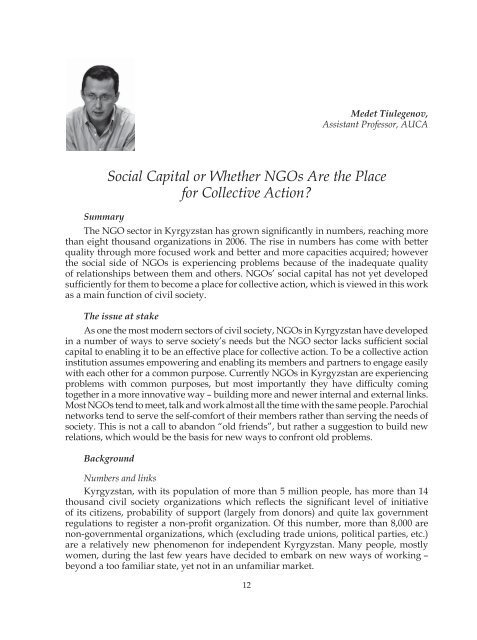KYRGYZSTAN TODAY Policy briefs on - Department of Geography
KYRGYZSTAN TODAY Policy briefs on - Department of Geography
KYRGYZSTAN TODAY Policy briefs on - Department of Geography
You also want an ePaper? Increase the reach of your titles
YUMPU automatically turns print PDFs into web optimized ePapers that Google loves.
Medet Tiulegenov,<br />
Assistant Pr<strong>of</strong>essor, AUCA<br />
Social Capital or Whether NGOs Are the Place<br />
for Collective Acti<strong>on</strong>?<br />
Summary<br />
The NGO sector in Kyrgyzstan has grown significantly in numbers, reaching more<br />
than eight thousand organizati<strong>on</strong>s in 2006. The rise in numbers has come with better<br />
quality through more focused work and better and more capacities acquired; however<br />
the social side <strong>of</strong> NGOs is experiencing problems because <strong>of</strong> the inadequate quality<br />
<strong>of</strong> relati<strong>on</strong>ships between them and others. NGOs’ social capital has not yet developed<br />
sufficiently for them to become a place for collective acti<strong>on</strong>, which is viewed in this work<br />
as a main functi<strong>on</strong> <strong>of</strong> civil society.<br />
The issue at stake<br />
As <strong>on</strong>e the most modern sectors <strong>of</strong> civil society, NGOs in Kyrgyzstan have deve loped<br />
in a number <strong>of</strong> ways to serve society’s needs but the NGO sector lacks sufficient social<br />
capital to enabling it to be an effective place for collective acti<strong>on</strong>. To be a collective acti<strong>on</strong><br />
instituti<strong>on</strong> assumes empowering and enabling its members and partners to engage easily<br />
with each other for a comm<strong>on</strong> purpose. Currently NGOs in Kyrgyzstan are experien cing<br />
problems with comm<strong>on</strong> purposes, but most importantly they have difficulty coming<br />
together in a more innovative way – building more and newer internal and external links.<br />
Most NGOs tend to meet, talk and work almost all the time with the same people. Parochial<br />
networks tend to serve the self-comfort <strong>of</strong> their members rather than serving the needs <strong>of</strong><br />
society. This is not a call to aband<strong>on</strong> “old friends”, but rather a suggesti<strong>on</strong> to build new<br />
relati<strong>on</strong>s, which would be the basis for new ways to c<strong>on</strong>fr<strong>on</strong>t old problems.<br />
Background<br />
Numbers and links<br />
Kyrgyzstan, with its populati<strong>on</strong> <strong>of</strong> more than 5 milli<strong>on</strong> people, has more than 14<br />
thousand civil society organizati<strong>on</strong>s which reflects the significant level <strong>of</strong> initiative<br />
<strong>of</strong> its citizens, probability <strong>of</strong> support (largely from d<strong>on</strong>ors) and quite lax government<br />
regulati<strong>on</strong>s to register a n<strong>on</strong>-pr<strong>of</strong>it organizati<strong>on</strong>. Of this number, more than 8,000 are<br />
n<strong>on</strong>-governmental organizati<strong>on</strong>s, which (excluding trade uni<strong>on</strong>s, political parties, etc.)<br />
are a relatively new phenomen<strong>on</strong> for independent Kyrgyzstan. Many people, mostly<br />
women, during the last few years have decided to embark <strong>on</strong> new ways <strong>of</strong> working –<br />
bey<strong>on</strong>d a too familiar state, yet not in an unfamiliar market.<br />
12
















